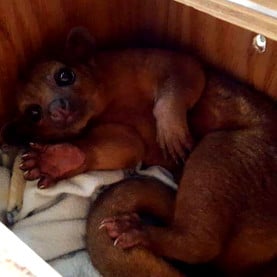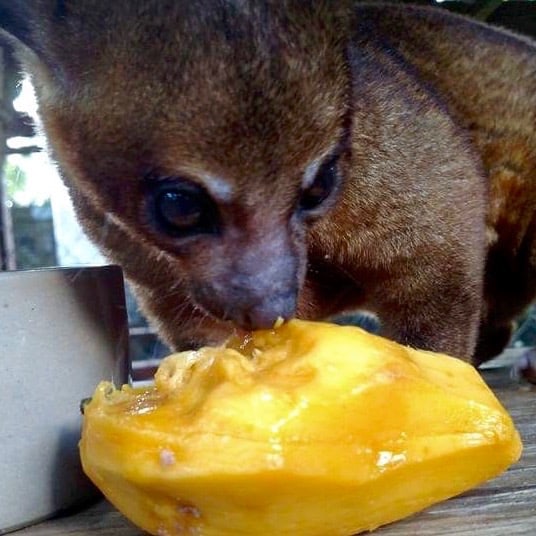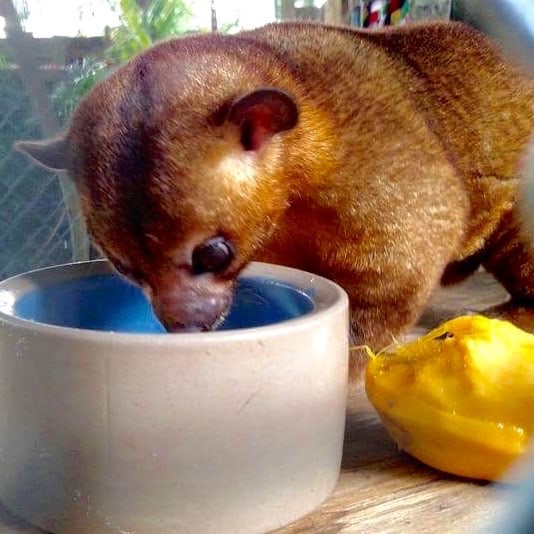The Kinkajou (Potos flavus) is a rainforest mammal of the family Procyanidae and is also known as the “honey bear”. They may live up to 40 years in captivity. Native to Central and South America, it is arboreal and rarely seen by people unless hunted for meat or pelt. It is most closely related to the raccoon, but is often mistaken for a ferret or monkey.
Koopa was acquired at 4 months of age and lived the next 8 months with Julieanne, a ring-tailed lemur. He’s nocturnal and sleeps during the daytime, while she’s diurnal and active in the daylight. Although carnivorous, the majority of their diet is ripe fruits. Koopa is obviously enjoying the ripe mango enough to venture out in broad daylight.
This little guy looks for the darkest spot to hide and has decided that he loves the box we found and converted for him. He twists and turns in all sorts of contortions trying to get comfortable in his little fort. He especially seems to love the fact that it’s not big enough for two and he can get away from Julieanne for a long nap!
Florida Fish and Wildlife Conservation Commission (FWC) regulates exotic animals. Since the Lemur and Kinkajou are not on the list requiring Class I (most dangerous), Class II, or those not requiring a permit, they fall under the Class III license of “all ther regulated exotics”. This is a free online permit and is how exotic pet stores can sell lemurs, kinkajous, skunks, or foxes.
We hope people will learn from Koopa & Julieanne’s story and reconsider buying exotic pets from pet stores.
March 2017
Recently we were able to form a partnership with Desoto Environmental Learning Lab and Outdoor Classroom. This is a facility that has been in existence many years providing a home to animals that educate school students on a daily basis. The ELL found that they had several empty enclosures and were looking to help animals in need.

One of those enclosures was a large habitat that was designed specifically for a kinkajou, complete with a heated house that automatically turns on when the temperature falls below 57 degrees. Shy Wolf Sanctuary had rescued Koopa the kinkajou and was prepared to build him a new habitat when we learned that ELL had one already fitted to his needs. We decided that transferring him to ELL would provide him a larger habitat and the comfort of a heated house for those few nights when it gets too chilly for him. Koopa has adapted well and comes out to climb around and eat for the children visiting the center. Moving Koopa also enables Shy Wolf Sanctuary to provide a permanent home to two adorable raccoons that our volunteers rescued and nursed from infancy. We’re hoping that Andy and Mikey will be great friends with Rocket, the raccoon we rescued a couple of years ago.
This partnership is enabling us to help other animals. We’ve been able to transfer a pair of prairie dogs, Faye and AJ, and Rebel, the raccoon to a new home in Desoto. The prairie dogs have moved from a small cage on our porch to a giant enclosure that allows them to dig and run around to their heart’s desire. ELL already has two raccoons, so it is our sincere hope that Rebel will meet a new friend.
Working with ELL holds promise for the future as we help to modify their coyote habitat and transition two of our most shy coyotes to a larger area with a girl coyote next door. Making that move will allow our other coyotes to have a little more room and a better life





Leave a Reply